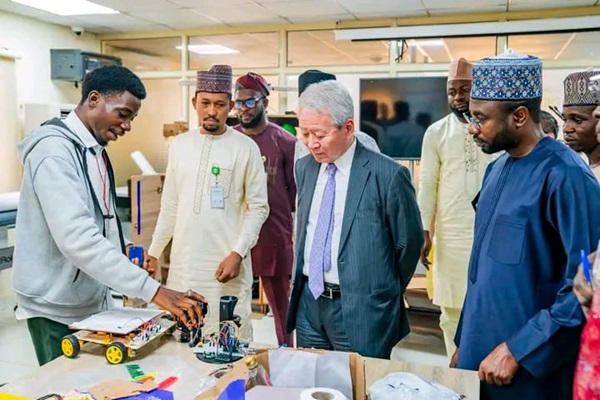Place your adverts here on InfoDig @ low rates; banner ads, sponsored links and guest articles etc. Contact us
… as 82 Million Nigerians totter on edge of food insecurity
 Farmers in the field.
Farmers in the field.The National Biotechnology Development Agency (NBRDA) has advocated for the adoption and consumption of genetically modified (GM) crops as a viable solution to Nigeria’s food insecurity crisis.
This call was made by the director of the agricultural biotechnology department of NBRDA, Dr. Rose Gidado, during the 2024 Farmers’ Day celebration organised by the All Farmers Association of Nigeria (AFAN) in Abuja.
Gidado highlighted the escalating global demand for food due to population growth, urbanisation and changing dietary preferences. She emphasised that biotechnology seeds, developed through genetic engineering and gene editing, present a revolutionary approach to enhancing crop productivity and nutritional content. “The challenges of food security remain significant, particularly in Sub-Saharan Africa and South Asia,” she stated. Factors contributing to food insecurity include population growth, climate change, pests, diseases and nutritional deficiencies.
According to Gidado, adopting biotechnology seeds can enhance crop resilience, improve yields and boost the nutritional content of food. These innovations are essential for achieving food security in a rapidly changing world, especially for Nigeria, which is grappling with a pressing food crisis.
In her address, the chairman of AFAN’s FCT Chapter, Hon. Nkechi Okafor reiterated the commitment of farmers in the Federal Capital Territory (FCT) to demonstrate that rural dwellers rely heavily on agriculture for their livelihoods. She emphasised the unity among farmers as they joined their counterparts worldwide to commemorate Farmers’ Day.
Okafor took the opportunity to appeal to the Minister of the Federal Capital Territory, Ezenwo Nyesom Wike, to support the AFAN proposal for allocating farmlands to its members across all six Area Councils. She emphasised that establishing cluster farming and cottage industries would encourage youth, women, and people with disabilities to pursue agriculture as a means of achieving nutrition and food security, aligning with President Bola Tinubu’s ‘Renewed Hope’ agenda.
The United Nations reports that Nigeria, Africa’s most populous nation and largest economy, is experiencing a historic food insecurity crisis, with many citizens facing famine and malnutrition. The resident humanitarian coordinator of the Food and Agriculture Organisation (FAO), Taofiq Braimoh recently revealed alarming findings from an annual food security survey, indicating that approximately 22 million Nigerians will face food insecurity in 2024, with 80 to 82 million at risk of severe food insecurity by 2030.
Braimoh highlighted the challenges Nigeria faces, including climate change, unreliable water patterns, and pest infestations that threaten agricultural productivity. He emphasised that, as an agrarian society, the success of farms directly impacts food availability for the population. “Leveraging technology is crucial to strengthening our agriculture sector and ensuring food security,” he stated.
Genetically modified (GM) crops are considered a viable solution to augment food production and mitigate the adverse effects of looming scarcity. As Nigeria faces a historic famine, the timely introduction of locally engineered biotech food crops becomes increasingly vital. Embracing the cultivation and consumption of these crops not only supports homegrown scientific efforts but also significantly enhances food security for the nation.
In summary, experts and agricultural leaders agree that biotechnology offers innovative solutions to Nigeria’s food crisis. By adopting GM crops, the nation can potentially transform its agricultural landscape, ensuring a more secure and sustainable food supply for its growing population. The collaboration between government agencies, farmers, and scientific institutions will be critical in realising this vision and addressing the pressing challenges of food insecurity.








)






 English (US) ·
English (US) ·